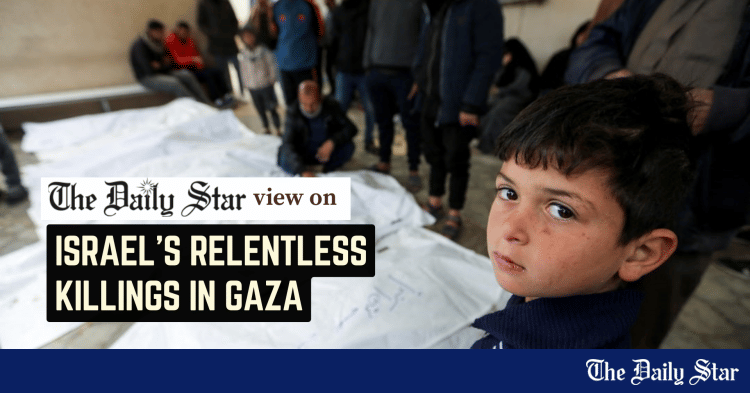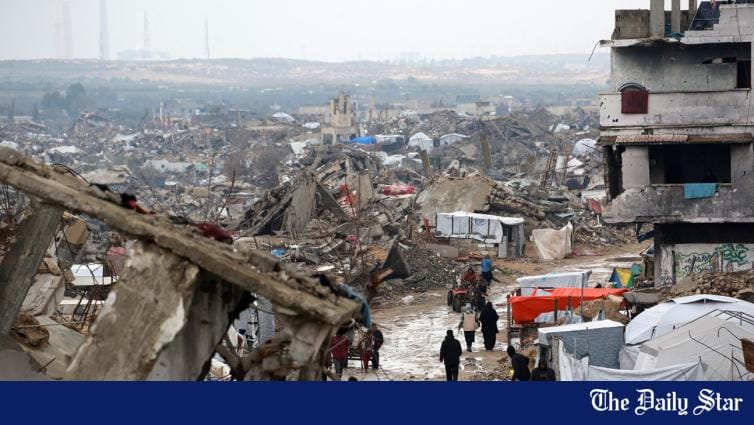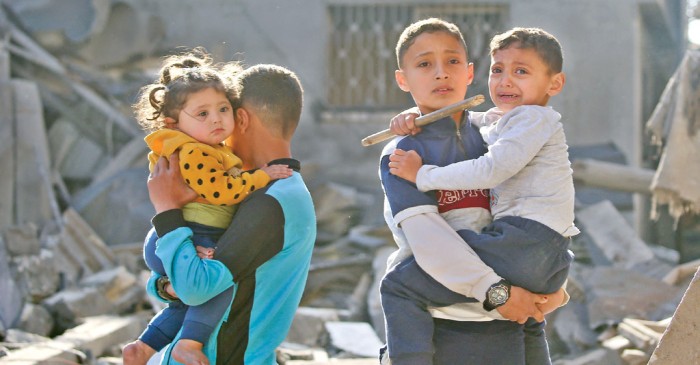Saif
Senior Member
- Joined
- Jan 24, 2024
- Messages
- 16,880
- Likes
- 8,153
- Nation

- Residence

- Axis Group


Israel expands Gaza ground operation
Israel’s military on Thursday expanded ground operations across Gaza, after it reported missiles intercepted from Yemen and Hamas militants said they fired rockets towards Tel Aviv.
 www.newagebd.net
www.newagebd.net
Israel expands Gaza ground operation
Agence France-Presse . Gaza City 21 March, 2025, 23:53

Palestinians use a donkey-pulled cart to transport their belongings as they flee Beit Lahia in the northern Gaza Strip on Friday. | AFP photo
Israel’s military on Thursday expanded ground operations across Gaza, after it reported missiles intercepted from Yemen and Hamas militants said they fired rockets towards Tel Aviv.
The rocket fire from Hamas was its first military response to the growing civilian death toll from Israel’s resumption of aerial bombardment and ground operations in Gaza this week.
The offensive has drawn widespread condemnation and shattered a relative calm in the war-ravaged Palestinian territory where a ceasefire began on January 19. Talks on extending the truce reached an impasse, and Israel resumed intensive bombing of Gaza on Tuesday.
Early Friday, the head of Shin Bet — Israel’s domestic intelligence agency — was sacked, days after prime minister Benjamin Netanyahu said he no longer trusts him, and fallout from a report on the October 7, 2023 Hamas attack that sparked the conflict.
Netanyahu on Sunday cited an ‘on-going lack of trust’ as the reason for moving to dismiss Ronen Bar, who joined the agency in 1993.
Late Thursday the military said troops had begun ‘conducting ground activity’ in the Shabura area of Rafah, Gaza’s southernmost city near the Egyptian border.
‘As part of the activity, the troops dismantled terrorist infrastructure,’ the military said in a statement, adding that ‘troops are continuing ground activity in northern and central Gaza.’
Israel earlier said it had closed off the territory’s main north-south route as part of expanding ground operations that resumed on Wednesday.
Gaza’s civil defence agency said 504 people had been killed since Tuesday, including more than 190 under the age of 18.
The toll is among the highest since the war started more than 17 months ago with Hamas’s attack on Israel.
The armed wing of Hamas, the Ezzedine al-Qassam Brigades, said it fired rockets at Israel’s commercial centre in response to ‘massacres’ of Gaza civilians.
The Israeli army said it intercepted a missile launched from Yemen, claimed by Iran-backed Huthi rebels who say they act in support of the Palestinians, for the second time within a day.
US president Donald Trump ‘fully supports’ Israel’s renewed Gaza operations, White House press secretary Karoline Leavitt told reporters when asked if he was trying to get a Gaza ceasefire back on track.
Israel’s military said an air strike had ‘in recent days’ killed Rashid Jahjouh, the head of Hamas’s internal security agency.
In Beit Lahia, northern Gaza, Alaa Abu Nasr said 17 members of his family were killed in an air strike.
‘They are targeting civilians, not fighters,’ he said among the rubble.
Military spokesman Avichay Adraee said on X that Israeli troops ‘have begun a targeted ground operation in the central and southern Gaza Strip in order to expand the security zone between the northern and southern parts’.
Movement along Salaheddin Road between northern and southern Gaza is prohibited ‘for your safety’, he said.
Palestinians were seen fleeing south along a section of Salaheddin Road still open, near central Gaza’s Nuseirat refugee camp, atop donkey-drawn carts piled high with belongings.
In Gaza’s south, the army warned people to evacuate Bani Suheila before a strike on militants ‘firing rockets from populated areas’.
Government spokesman David Mencer said Israel controlled central and southern Gaza and was ‘expanding the security zone’ and creating a buffer between the north and south.
An official from Gaza’s interior ministry said the Israeli army had closed what it calls Netzarim Junction, just south of Gaza City on Salaheddin Road.
The official said Israeli tanks had deployed at the junction after the withdrawal of American private security contractors stationed there since the pullback of Israeli forces in February, under the ceasefire.
The first stage of the ceasefire, under which Israeli hostages held by Hamas were exchanged for Palestinian prisoners, expired early this month.
Israel rejected negotiations for a second stage, demanding the return of all remaining hostages under an extended first stage. Hamas insisted on engaging in talks for phase two.
Under the agreed truce deal, as outlined by then-US president Joe Biden, negotiations towards phase two were to begin during the initial six-week phase.
Mkhaimar Abusada, an associate professor at Al-Azhar University in Gaza, said that if Netanyahu ‘was really interested in releasing all Israeli hostages, he could have gone with a second phase of the ceasefire. But he has never made any commitment to an end to the war’.
Speaking before the UN Security Council, former hostage Eli Sharabi called on the world to ‘bring them all home’, referring to the dozens still held by Gaza militants.
He said he was ‘chained, starved, beaten and humiliated’ during his Hamas captivity.
Resumption of fighting in Gaza has coincided with a reignited protest movement by Israelis who see Netanyahu’s policies as a threat to democracy.
On Thursday president Isaac Herzog, whose role is largely ceremonial, spoke of ‘controversial initiatives that create deep rifts within our nation.’
He also called it ‘unthinkable to resume fighting while still pursuing the sacred mission of bringing our hostages home.’
Hamas appealed to Arab and Islamic nations ‘to take urgent action’ in the United Nations Security Council and other forums to halt the renewed fighting.
Iran’s supreme leader Ayatollah Ali Khamenei called Israel’s latest strikes on Gaza a ‘catastrophic crime’ and said the United States ‘shares responsibility’.
Hamas’s October attack on Israel that began the war resulted in 1,218 deaths, mostly civilians, according to Israeli figures.
The overall death toll in Gaza since the start of the war is 49,617, according to the Hamas-run territory’s health ministry.
Agence France-Presse . Gaza City 21 March, 2025, 23:53
Palestinians use a donkey-pulled cart to transport their belongings as they flee Beit Lahia in the northern Gaza Strip on Friday. | AFP photo
Israel’s military on Thursday expanded ground operations across Gaza, after it reported missiles intercepted from Yemen and Hamas militants said they fired rockets towards Tel Aviv.
The rocket fire from Hamas was its first military response to the growing civilian death toll from Israel’s resumption of aerial bombardment and ground operations in Gaza this week.
The offensive has drawn widespread condemnation and shattered a relative calm in the war-ravaged Palestinian territory where a ceasefire began on January 19. Talks on extending the truce reached an impasse, and Israel resumed intensive bombing of Gaza on Tuesday.
Early Friday, the head of Shin Bet — Israel’s domestic intelligence agency — was sacked, days after prime minister Benjamin Netanyahu said he no longer trusts him, and fallout from a report on the October 7, 2023 Hamas attack that sparked the conflict.
Netanyahu on Sunday cited an ‘on-going lack of trust’ as the reason for moving to dismiss Ronen Bar, who joined the agency in 1993.
Late Thursday the military said troops had begun ‘conducting ground activity’ in the Shabura area of Rafah, Gaza’s southernmost city near the Egyptian border.
‘As part of the activity, the troops dismantled terrorist infrastructure,’ the military said in a statement, adding that ‘troops are continuing ground activity in northern and central Gaza.’
Israel earlier said it had closed off the territory’s main north-south route as part of expanding ground operations that resumed on Wednesday.
Gaza’s civil defence agency said 504 people had been killed since Tuesday, including more than 190 under the age of 18.
The toll is among the highest since the war started more than 17 months ago with Hamas’s attack on Israel.
The armed wing of Hamas, the Ezzedine al-Qassam Brigades, said it fired rockets at Israel’s commercial centre in response to ‘massacres’ of Gaza civilians.
The Israeli army said it intercepted a missile launched from Yemen, claimed by Iran-backed Huthi rebels who say they act in support of the Palestinians, for the second time within a day.
US president Donald Trump ‘fully supports’ Israel’s renewed Gaza operations, White House press secretary Karoline Leavitt told reporters when asked if he was trying to get a Gaza ceasefire back on track.
Israel’s military said an air strike had ‘in recent days’ killed Rashid Jahjouh, the head of Hamas’s internal security agency.
In Beit Lahia, northern Gaza, Alaa Abu Nasr said 17 members of his family were killed in an air strike.
‘They are targeting civilians, not fighters,’ he said among the rubble.
Military spokesman Avichay Adraee said on X that Israeli troops ‘have begun a targeted ground operation in the central and southern Gaza Strip in order to expand the security zone between the northern and southern parts’.
Movement along Salaheddin Road between northern and southern Gaza is prohibited ‘for your safety’, he said.
Palestinians were seen fleeing south along a section of Salaheddin Road still open, near central Gaza’s Nuseirat refugee camp, atop donkey-drawn carts piled high with belongings.
In Gaza’s south, the army warned people to evacuate Bani Suheila before a strike on militants ‘firing rockets from populated areas’.
Government spokesman David Mencer said Israel controlled central and southern Gaza and was ‘expanding the security zone’ and creating a buffer between the north and south.
An official from Gaza’s interior ministry said the Israeli army had closed what it calls Netzarim Junction, just south of Gaza City on Salaheddin Road.
The official said Israeli tanks had deployed at the junction after the withdrawal of American private security contractors stationed there since the pullback of Israeli forces in February, under the ceasefire.
The first stage of the ceasefire, under which Israeli hostages held by Hamas were exchanged for Palestinian prisoners, expired early this month.
Israel rejected negotiations for a second stage, demanding the return of all remaining hostages under an extended first stage. Hamas insisted on engaging in talks for phase two.
Under the agreed truce deal, as outlined by then-US president Joe Biden, negotiations towards phase two were to begin during the initial six-week phase.
Mkhaimar Abusada, an associate professor at Al-Azhar University in Gaza, said that if Netanyahu ‘was really interested in releasing all Israeli hostages, he could have gone with a second phase of the ceasefire. But he has never made any commitment to an end to the war’.
Speaking before the UN Security Council, former hostage Eli Sharabi called on the world to ‘bring them all home’, referring to the dozens still held by Gaza militants.
He said he was ‘chained, starved, beaten and humiliated’ during his Hamas captivity.
Resumption of fighting in Gaza has coincided with a reignited protest movement by Israelis who see Netanyahu’s policies as a threat to democracy.
On Thursday president Isaac Herzog, whose role is largely ceremonial, spoke of ‘controversial initiatives that create deep rifts within our nation.’
He also called it ‘unthinkable to resume fighting while still pursuing the sacred mission of bringing our hostages home.’
Hamas appealed to Arab and Islamic nations ‘to take urgent action’ in the United Nations Security Council and other forums to halt the renewed fighting.
Iran’s supreme leader Ayatollah Ali Khamenei called Israel’s latest strikes on Gaza a ‘catastrophic crime’ and said the United States ‘shares responsibility’.
Hamas’s October attack on Israel that began the war resulted in 1,218 deaths, mostly civilians, according to Israeli figures.
The overall death toll in Gaza since the start of the war is 49,617, according to the Hamas-run territory’s health ministry.




